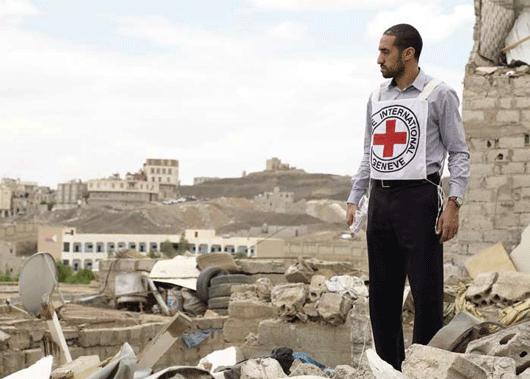
Local Editor
Humanitarian agencies struggling to assist millions caught up in Yemen’s civil war face obstacles on many fronts: insecurity and attacks on aid workers, limitations on access to people in need, restriction of movement and politicisation of humanitarian assistance preventing them from delivering aid impartially, amid widespread poverty and endemic food scarcity.
The international medical organization Doctors without Borders [MSF] said that in the last three months three of its health facilities in Yemen have come under attack and an ambulance driver was killed. The International Committee of the Red Cross [ICRC] said two aid workers were killed and another kidnapped and its office in Aden was attacked in what the ICRC said were obvious deliberate acts.
The high risks facing aid workers have disrupted the operations of thousands of local, Arab and international agencies, forcing many to close, suspend operations or function by proxy, relying on local staff, amid exacerbating humanitarian needs.
"People there are being subjected to this kind of violence on a daily basis. No one, not even health care workers, are being spared,".
"Ground fighting, air strikes as well as rising criminality have un¬doubtedly complicated our work, hampering an efficient humanitarian response and restricting field movements," noted Rima Kamal, the ICRC spokeswoman in Sana’a.
"Over the past six months, the ICRC has suffered from several serious security incidents. Securing safety guarantees for the passage of both staff and humanitarian aid is growing increasingly cumbersome with the multiplicity of the parties in the conflict. However, moving without these guarantees can result in deadly consequences and delay much needed humanitarian assistance," Kamal added via email to The Arab Weekly.
A Tunisian ICRC employee, Nouran Hawas, was kidnapped December 1st in Sana’a, prompting the organization to suspend staff movement. The ICRC has refused to comment publicly on the issue, stressing, however, that it is working nonstop to secure Hawas’s release.
The Saudi-led coali¬tion air strikes against Yemen since last March has devastated the poorest country in the region, setting off an acute humanitarian crisis. The United Nations estimates the war has claimed more than 7,000 lives, including 2,700 civilians, and made 21.1 million people - 80% of the population - almost entirely reliant on the international community for food, fuel, shelter and medicine.
Ahmad Karabish, a worker with the UN children’s agency UNICEF in Sana’a, said he sees many of the humanitarian activities funded by Arab and local parties being politically motivated.
"Arab humanitarian agencies were far less efficient than international organizations, which remain the most specialized in dispensing aid in the field," Karabish said.
But deliberate attacks targeting international actors have forced many to evacuate their expatriate staff, as others struggle to provide humanitarian assistance and protection to beleaguered populations in Yemen while facing larger challenges involving the protection of their own aid workers, especially national staff members.
"At least 90 international aid workers have left Yemen since the onset of the crisis. We now ask the international organizations to monitor closely the movement of their staff and restrict that movement within their premises," said Ali Shohra from the Ministry of Planning, which is in charge of coordinating the work of international organizations operating in Yemen.
"With the current constraints we are facing, we are unable to deliver on our full potential," Kamal said. "We are seeing increased attempts whereby the parties seek to influence where and to whom aid is distributed."
"What we are able to do remains sadly a drop in the ocean and it is very frustrating," Kamal added.
Frustration has been also strongly expressed by MSF.
"Four of our medical facilities have been attacked in four months in Yemen and Afghanistan," said MSF International President Joanne Liu said in a recent statement.
"Is this the new normal: an MSF hospital bombed every month? We urgently need guarantees from warring parties that functioning hospitals are never a legitimate target."
Source: News Agencies, Edited by Website Team